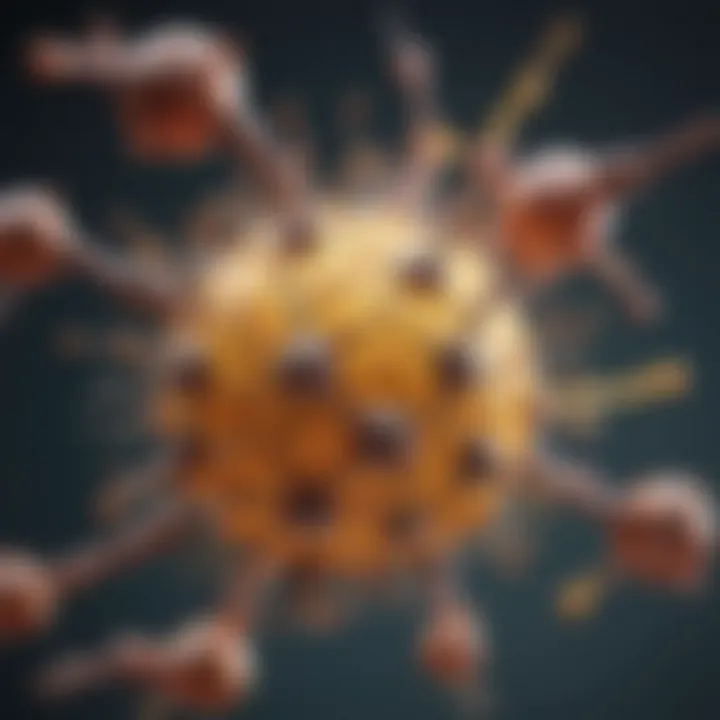Omega Fatty Acids and ADHD: A Comprehensive Guide


Intro
Attention Deficit Hyperactivity Disorder, commonly known as ADHD, affects countless individuals and their ability to focus, control impulses, and maintain a steady attention span. In recent years, the relationship between nutrition and ADHD has gained traction, shedding light on how certain dietary components play pivotal roles in managing the condition. Among these nutrients, omega fatty acids, particularly Omega-3 and Omega-6, have been under the microscope, sparking interest in their potential benefits for cognitive function and behavioral improvements.
These essential fats aren’t just buzzwords in nutrition circles; they are crucial for brain health and functioning. While one might think of omega fatty acids as merely elements of trendy diets, emerging studies indicate a more profound relationship between these nutrients and ADHD. Understanding this connection can empower educators, researchers, and caregivers to devise holistic strategies when dealing with ADHD. But, before diving into the latest findings, let’s first explore recent developments in this field.
Recent Advances
Latest Discoveries
Research surrounding omega fatty acids is advancing rapidly, shedding light on their impact on ADHD symptoms. Recent studies have demonstrated that Omega-3 supplements can lead to improvements in attention, hyperactivity, and impulsivity in children diagnosed with ADHD. For instance, a 2022 clinical trial published in Journal of Attention Disorders found that children who were provided with a daily dose of Omega-3 showed a significant reduction in hyperactive behavior compared to those who received a placebo.
While coat-tailing on earlier theories, these findings reinforce the notion that dietary interventions can complement traditional therapeutic approaches. Moreover, scientists are starting to unravel the mechanisms behind these improvements, suggesting linkage between omega fatty acid intake and enhanced neuroplasticity, which in simpler terms, is the brain's ability to reorganize itself by forming new neural connections.
Technological Innovations
The advent of advanced techniques in molecular biology and neuroimaging has enabled researchers to investigate how omega fatty acids exert their influence on the brain. Using methods like diffusion tensor imaging (DTI), scientists are now capable of observing alterations in brain structures in real-time, allowing them to ascertain how proper omega intake can lead to improved connectivity in areas crucial for attention and self-regulation.
That said, these technological leaps are bringing forth deeper insights into the bioavailability of omega fatty acids from various sources, which can cause one to rethink dietary recommendations. The synthesis of dietary guidelines is becoming increasingly nuanced, with innovations in personalized nutrition taking center stage.
Methodology
Research Design
Much of the ongoing research employs a mix of randomized controlled trials and longitudinal studies, aimed at establishing a stronger causal link between omega fatty acid consumption and symptom management in ADHD patients. These rigorous designs help eliminate biases and provide clearer insights into the effectiveness of various omega sources.
Data Collection Techniques
Data collection has also evolved. Many studies now include advanced questionnaires and behavioral assessments conducted by trained psychologists, alongside dietary recall methods to ensure accuracy. This triangulation of data enables a more holistic understanding of how omega fatty acids fit within the broader context of ADHD management, facilitating targeted recommendations tailored to specific needs.
"Incorporating omega fatty acids in one’s diet may not act as a stand-alone solution, but it surely holds promise as a complement to existing treatments for ADHD."
By exploring these innovative research methodologies and findings, further insights emerge that can illuminate the path for educators, researchers, and professionals grappling with the multifaceted challenges presented by ADHD. The intersection of dietary science and neuropsychology provides fertile ground for cultivating effective strategies aimed at improving cognitive health.
Understanding ADHD
Understanding Attention Deficit Hyperactivity Disorder, commonly abbreviated as ADHD, serves as a cornerstone for appreciating how nutrition and dietary choices can impact the management of this condition. ADHD is not merely a childhood issue—it's a multifaceted neurodevelopmental disorder that often extends into adulthood, influencing countless lives worldwide.
The significance of grasping the nuances of ADHD lies in effectively addressing its symptoms and challenges. Symptoms range widely, including inattention, hyperactivity, and impulsivity. These can significantly disrupt academic performance, occupational achievement, and social interactions. Fully comprehending ADHD means recognizing how it intertwines with daily activities and mental health, which is particularly crucial when considering alternate management strategies, such as dietary adjustments involving omega fatty acids.
In many ways, the dialogue around ADHD now emphasizes the need for a holistic approach. This approach covers not just medical interventions, but also nutritional strategies that may enhance cognitive function and overall well-being. As we delve deeper into the relationship between omega fatty acids and ADHD, it is important to remember that what we eat can profoundly affect how our brains perform. By understanding these connections, we equip ourselves and others with the tools needed to navigate and possibly mitigate ADHD symptoms effectively.
Clinical Definition
ADHD is clinically defined as a persistent pattern of inattention and/or hyperactivity-impulsivity that interferes with functioning or development. These behaviors must be present for at least six months and should be inconsistent with the developmental level of the individual. The diagnosis often requires a comprehensive evaluation, including standardized rating scales, interviews, and input from caregivers and teachers.
The most widely accepted diagnostic criteria, outlined in the Diagnostic and Statistical Manual of Mental Disorders (DSM-5), categorize ADHD symptoms into two primary types:
- Inattentive Type: Characterized by difficulties in sustaining attention, forgetfulness in daily activities, and careless mistakes in schoolwork or other tasks.
- Hyperactive-Impulsive Type: Involves excessive fidgeting, interrupting others, and difficulty remaining seated.
Recognizing this clinical definition not only aids in the accurate diagnosis of ADHD but also lends insight into potential areas where omega fatty acids, particularly omega-3s, might play a role in symptom management.
Prevalence and Demographics
ADHD presents a significant public health challenge, affecting individuals across all age groups, though it is predominantly identified in children. Statistics indicate that around 5% of children worldwide are diagnosed with ADHD, although estimates often vary due to differences in diagnostic criteria and cultural perceptions of behavior.
Factors influencing prevalence rates include:
- Geographical Variations: ADHD diagnosis rates are higher in North America compared to other regions.
- Gender Differences: Boys are diagnosed more frequently than girls, although recent studies suggest that girls may exhibit less overt hyperactivity, which can lead to underdiagnosis.
Cultural stigmas and varying understandings of mental health further complicate the true prevalence figures. Many individuals may suffer in silence due to misconceptions surrounding ADHD.
"An understanding of ADHD’s prevalence and its complexities provides essential context for discussing the potential benefits of omega fatty acids in managing its symptoms."
Grasping the demographics and factors influencing ADHD can pave the way for individualized interventions, possibly integrating omega fatty acids as a supportive measure in the wider management of ADHD.


The Role of Nutrition in ADHD
Nutrition plays a pivotal role in the management of Attention Deficit Hyperactivity Disorder (ADHD). As we delve into this area, it becomes evident that a well-rounded diet does not merely fuel the body, but also nourishes the brain, impacting cognitive function and behavior. The food we consume can either exacerbate or alleviate the symptoms associated with ADHD, making understanding the nuances of dietary choices essential for those affected by the disorder.
Nutritional Deficiencies and ADHD Symptoms
Various studies have suggested that nutritional deficiencies may be linked to the severity of ADHD symptoms. Specific nutrients, when deficient, can lead to an increased risk of behavioral problems.
- Omega-3 Fatty Acids: These are often highlighted due to their neuroprotective properties. Evidence suggests that low levels of omega-3s relate to heightened impulsivity and inattention. A diet low in omega-3 can leave individuals at the mercy of ADHD symptoms, making supplementation a critical consideration.
- Zinc and Magnesium: Both minerals have shown promise in improving symptoms of ADHD. Deficiency in these elements may lead to heightened distractibility and emotional instability. Studies have pointed towards a correlation between low zinc levels and increased hyperactivity in children.
- Iron: An overlooked nutrient, iron deficiency can manifest in cognitive impairment, particularly in attention regulation. Ensuring adequate iron levels can support dopamine regulation, a neurotransmitter crucial for concentration and focus.
Nutritional insufficiencies might be subtle, but their cumulative effects on ADHD behaviors can be profound. Fostering awareness around these deficiencies is key.
Impact of Dietary Choices
The choices made in one's diet can have significant implications for managing ADHD symptoms. Dietary patterns, rather than individual foods, emerge as a critical factor.
- Balanced Diet: A robust diet rich in fruits, vegetables, whole grains, and lean proteins can help stabilize blood sugar levels and improve mood and focus. Integrating a variety of food groups ensures a comprehensive intake of vital nutrients.
- Processed Foods: A diet high in processed foods and sugar can worsen ADHD symptoms. Studies indicate that artificial additives and colorings may exacerbate hyperactive behavior in predisposed individuals.
- Caffeine: Interestingly, while caffeine is often seen as a stimulant, it can affect children differently based on their unique neurochemistry. Some find that caffeine moderates their focus, while others may find it increases restlessness.
- Example Meals: Consider meals loaded with fatty fish— like salmon— paired with greens to provide both omega-3s and necessary vitamins.
"Dietary choices can make or break the daily functioning of a child with ADHD. Parents must be informed to make the best choices for their loved ones."
Omega Fatty Acids Explained
Understanding omega fatty acids is crucial in the context of ADHD management. These essential fats play a significant role not just in overall health but specifically in neurodevelopmental functions. They help in regulating neurotransmitters, impacting mood and behavior, which is why their implications for ADHD are profound. When we delve into omega fatty acids, we are looking at more than just nutrients; we are considering potential pathways for improving cognitive function and emotional regulation in affected individuals.
Types of Omega Fatty Acids
Omega-3
Omega-3 fatty acids are often hailed as the star of the omega group. Their role in brain health and cognitive function cannot be overstated. Rich in EPA and DHA, omega-3s contribute significantly to the development of neuronal structure and function. One of their key characteristics is their anti-inflammatory property, which can positively influence mental clarity and reduce symptoms like impulsivity and hyperactivity characteristic of ADHD.
One unique feature of omega-3 fatty acids is their presence in cold-water fish such as salmon and mackerel, which offer a rich source of these essential fats. Unlike many other dietary fats, omega-3s are generally considered safe with minimal reported side effects, making them a popular choice amongst parents and healthcare providers alike for addressing ADHD symptoms.
Omega-6
Omega-6 fatty acids, while also important, serve different functions compared to omega-3s. They are vital for cell structure and energy. Linoleic acid, a primary form of omega-6 found in vegetable oils, is essential for the growth and development of children.
The key characteristic that differentiates omega-6 from omega-3 is their pro-inflammatory role in the body. While some inflammation is beneficial, an imbalance occurs when omega-6 intake overshadows omega-3. This can potentially exacerbate hyperactivity in ADHD patients. Hence, while omega-6s are not inherently negative, moderation is key in the overall context of dietary intake.
Omega-9
Omega-9 fatty acids, which include oleic acid found in olive oil, are not considered essential because the body can produce them. However, they do present noteworthy benefits. Omega-9s may help reduce the risk of cardiovascular diseases and are thought to contribute positively to brain health, though their direct connection to ADHD is not as well established as that of omega-3s.
The standout quality of omega-9s is their ability to support a healthy inflammatory response, which can have a beneficial effect in individuals with ADHD. Despite not being essential, they are a beneficial addition to the diet and can be easily incorporated through sources like avocados and nuts.
Sources of Omega Fatty Acids
Dietary Sources
When it comes to dietary sources of omega fatty acids, one cannot ignore the varied options available. Certain types of fish like sardines and trout, as well as flaxseeds and walnuts, are excellent sources of omega-3s. On the other hand, vegetable oils such as sunflower and corn oil provide omega-6 fatty acids.
Highlighting the bioavailability of these sources is essential. The body's ability to absorb and utilize these fatty acids from whole food sources is typically superior to that from supplements. Therefore, advocating for a based diet rich in these fatty acids should be encouraged, as they promote not only cognitive health but also overall well-being.
Supplementation Options
In instances where dietary intake may fall short, supplementation could be a viable alternative. Here one can find fish oil capsules or algal oil supplements, which are plant-based and serve as solid sources of omega-3s.
The key feature of these supplements is their convenience and effectiveness in providing targeted fatty acids to support brain health. However, they are not without their disadvantages; potential side effects, including gastrointestinal discomfort and dietary restrictions for certain individuals, must be kept in mind. Moreover, ensuring the quality and purity of supplements is crucial, as contaminants can interfere with their benefits.
Taking into account both dietary sources and supplements creates a balanced approach that can enhance omega fatty acid intake and cater to specific health needs, especially in those facing challenges related to ADHD.
"A balanced intake of omega fatty acids can be foundational for supporting cognitive function and managing ADHD symptoms, but it’s essential to approach this with a holistic perspective on diet and health."
Research on Omega Fatty Acids and ADHD


Understanding the role that omega fatty acids play in managing ADHD requires a thorough examination of existing research. There is an increasing body of evidence suggesting that these essential fatty acids might not just be beneficial but can also have a significant impact on ADHD symptoms. This section focuses on key studies and the underlying mechanisms through which omega fatty acids exert their effects, providing an insightful look into how dietary choices might soothe ADHD manifestations.
Review of Key Studies
Many studies have explored the relationship between omega fatty acids and ADHD, with varying conclusions that offer insights into their potential benefits. For instance, a meta-analysis conducted in 2018 evaluated several trials involving omega-3 supplementation and noted improvements in attention and behavioral function among participants. Some children showed noticeable reductions in hyperactivity after consistent intake of these fatty acids.
Another pivotal study published in the Journal of Attention Disorders found that higher dietary intake of omega-3 was linked to lower ADHD symptom severity in a sample of school-aged children. Researchers discovered that those with a diet rich in fish—known for its high omega-3 content—displayed fewer behavioral issues compared to their peers. Not only did these findings underscore the importance of dietary sources, but they also prompted further inquiries about specific omega fatty acid profiles and their cognitive benefits.
"The role of omega-3 fatty acids in neurodevelopment suggests that improved dietary habits may lead to significant behavioral changes in children with ADHD."
Aside from omega-3, the significance of omega-6 fatty acids has also surfaced in research. Although the balance between omega-6 and omega-3 intake often gets attention, various studies suggest that increasing omega-6 may inadvertently exacerbate ADHD symptoms if not balanced appropriately with omega-3. This highlights the intricate relationship between these nutrients and the importance of understanding their respective roles.
Mechanisms of Action
Digging deeper, how do omega fatty acids actually influence brain function? A few mechanisms have been proposed.
- Neurotransmitter Regulation: Omega-3 fatty acids, particularly EPA and DHA, may enhance the fluidity of cell membranes, thereby facilitating better neurotransmitter function. This influence could translate into improved communication between neurons, possibly steering cognition and attention in a more favorable direction.
- Anti-Inflammatory Effects: Chronic inflammation is often associated with neurodevelopmental disorders. Omega-3s exhibit anti-inflammatory properties that may reduce neuroinflammation in the brain. This reduction could lead to enhanced cognitive abilities and lessened symptoms of ADHD.
- Modification of Gene Expression: Some studies also suggest that omega fatty acids can influence the expression of genes involved in brain function and development, which could enhance synaptic plasticity—an essential factor in learning and memory processes.
Understanding these mechanisms offers hope for developing targeted dietary strategies to help manage ADHD. Combining omega fatty acids into treatment regimens could potentially enrich the quality of life for many affected individuals.
In summary, the research dedicated to omega fatty acids in the context of ADHD illustrates a promising area of inquiry. It emphasizes the need for continued exploration into dietary strategies that can complement traditional therapies.
Best Omega Sources for ADHD
Understanding the best omega sources for ADHD is pivotal in harnessing the potential benefits these fatty acids offer for managing symptoms associated with attention deficit hyperactivity disorder. Omega-3 and omega-6 fatty acids can play a crucial role not just in cognitive function but also in overall brain health, which is significant for those dealing with ADHD. Better intake of these nutrients may lead to improvements in concentration, mood, and behavioral responses.
Top Omega-3 Sources
When discussing crucial dietary inclusions, omega-3 sources take center stage. These fatty acids are primarily known for their anti-inflammatory properties and their positive impact on neuronal function. Here are some potent sources that you should definitely consider:
- Fatty Fish: Salmon, mackerel, sardines, and anchovies are some of the richest natural sources of omega-3. Including these in meals two to three times a week can profoundly provide essential nutrients.
- Chia Seeds: These little seeds pack a punch. Not only do they contain omega-3, but they're also rich in fiber and protein, making them an ideal additive to smoothies or yogurt.
- Walnuts: A handful of walnuts is a simple way to boost omega-3 intake. They’re easy to add to a salad or munch on as a snack.
- Flaxseeds: Ground flaxseeds can be mixed into various foods and are a great vegetarian source of omega-3. Just be sure to grind them for better absorption.
- Algal Oil: A fantastic option for vegetarians and vegans, algal oil provides omega-3 derived from algae and can often come in capsule form, offering an alternative to fish oil.
Omega-6 vs. Omega-3: What Matters
In the conversation about omega fatty acids, the relationship between omega-6 and omega-3 is often highlighted. While both are essential, the balance is what truly matters. Omega-6 fatty acids generally come from vegetable oils, nuts, and seeds, contributing to inflammation if overconsumed. Here are some key points to ponder:
- Balance is Key: The ideal dietary ratio of omega-6 to omega-3 has been suggested to be around 4:1 or lower. Unfortunately, many diets contain a ratio closer to 15:1 or even 30:1, primarily due to the heavy use of processed oils.
- Inflammation vs. Anti-inflammatory: Omega-6 can sometimes promote inflammatory processes, while omega-3 works to mitigate them. Therefore, excessive omega-6 intake can overshadow the benefits that omega-3s offer for those with ADHD.
- Practical Adjustments: Reducing the intake of processed foods, which are often high in omega-6, while simultaneously increasing omega-3 sources can lead to better outcomes not only for ADHD but also for overall health.
It is essential to consider the types of fats one consumes. A balanced intake fosters a healthier brain environment, potentially alleviating some ADHD symptoms.
By focusing on these dietary considerations, educators, students, researchers, and professionals can unlock a pathway toward improved cognitive health through omega fatty acids. The synergy between the right omega sources lays the groundwork for a targeted and effective nutritional strategy against the challenges posed by ADHD.
Dosing Guidelines
Recommended Daily Intake
When dealing with omega fatty acids, knowing the recommended daily intake is vital, especially for those managing ADHD symptoms. The general guideline is that adults should aim for at least 250 to 500 milligrams of combined EPA and DHA. For children, smaller doses are typically advisable, around 100 to 200 milligrams, depending on age and dietary habits. These guidelines are set to support cognitive function and overall well-being, making it essential for parents and caretakers to have a clear idea of these values.
Omega-3 fatty acids, found prominently in fish like salmon and mackerel, play a crucial role in brain health. According to some studies, high concentrations of EPA and DHA can contribute significantly to reducing symptoms associated with ADHD. This doesn’t mean quantities should be crammed down, though—it's all about balance.
One should also consider the source of these fats. For instance, someone getting their omega-3s from fish might not need as much as someone relying on flaxseed oil, because the body processes these sources differently. Here’s a simple breakdown of common sources and their recommended intake:
- Fatty Fish (like salmon): Aim for 2 servings a week.
- Fish Oil Supplements: 1000 mg daily is often cited but check with a healthcare provider for personal needs.
- Chia Seeds or Flaxseeds: One tablespoon daily can be effective for plant-based sources.
"Consistency is key; incorporating omega fatty acids regularly into your diet can yield better long-term benefits for cognitive function."
Potential Overdose Risks
While omega fatty acids are generally recognized as beneficial, it's still crucial to acknowledge the potential risks of overdosing. Excessive intake, particularly from supplements, can lead to various health issues. Reports suggest that dosages exceeding 3 grams per day can increase the risk of bleeding or bruising due to their blood-thinning properties.
Other possible side effects from high doses might include:
- Gastrointestinal discomfort, like nausea or diarrhea.
- Potential interaction with medications, especially blood thinners.
- Erratic blood sugar levels in some individuals.
It’s important for anyone considering high doses to consult with a healthcare professional. Personalized assessments are key—what works for one individual may not for another.


The crux of the matter is this: while omega fatty acids can provide a wealth of benefits, moderation must remain at the forefront of consumption strategies. Protecting one’s health should always take precedence over the pursuit of any supplement's purported advantages.
Case Studies and Clinical Observations
In the realm of ADHD and nutritional interventions, case studies and clinical observations play a crucial role. These practical insights contribute significantly to our understanding of how omega fatty acids may influence behavior, cognition, and overall well-being in those diagnosed with attention deficit hyperactivity disorder.
When discussing case studies, we embark on a narrative that highlights specific instances where omega fatty acids were incorporated into treatment regimens. This provides a window into real-world applications, demonstrating not only the efficacy of such approaches but also the variability in individual responses. As we delve into these accounts, we gain a nuanced perspective on how dietary fats may offer benefits beyond theoretical discussions and laboratory findings.
Clinical Trials Assessment
Clinical trials surrounding omega fatty acids and ADHD have shed light on this intersection of nutrition and psychiatry. The systematic study design assesses the influence of these fatty acids on ADHD symptoms through controlled methodologies. For instance, studies have trialed various forms of omega-3 and omega-6 supplements to measure their effects on attention span, impulsivity, and hyperactivity.
These trials often compare groups receiving omega supplements against control groups taking placebos, creating a robust environment for analysis. Studies, such as those published in nutritional journals, often use standardized assessments to gauge behavioral changes and cognitive improvements, leading to findings that can inform treatment guidelines.
Yet, while clinical trials provide valuable data, they also pose questions regarding sample sizes and participant diversity. Many of the studies have limitations – for example, a small number of participants may lead to outcomes that aren’t generalizable to the broader population, or the focus on a single demographic can overlook how various cultures and lifestyles approach dietary practices.
"Real-world results from case studies illustrate the variability of treatment responses, indicating that what's effective for one may not be for another."
Patient Testimonials
Patient testimonials bring a human element to the otherwise clinical narratives found in research. When families share their experiences with omega fatty acids, they articulate the challenges and triumphs in managing ADHD symptoms through dietary changes. Stories abound of parents incorporating fish oil supplements into their children's routines and observing noticeable changes in focus and behavior. These accounts serve as anecdotal evidence, filling in gaps left by clinical trials.
However, one must approach these testimonials with caution. They are subjective and can be influenced by various factors - behavioral therapy, medication changes, or even the placebo effect. It’s important for parents and practitioners alike to consider these stories within a wider context of possible interventions.
Consider the experience of a mother in a support group who recounts how her son, after several months of omega-3 supplementation, showed improvements in both his academic performance and social interactions. Such personal insights not only encourage others to explore these options but also pressure researchers to investigate further how dietary interventions could complement traditional treatments.
Combining clinical assessments with patient feedback has the potential to paint a fuller picture of how omega fatty acids may address ADHD symptoms, ultimately guiding education and policy in dietary recommendations. Thus, clinical observations and case studies intertwine with scientific inquiry, enhancing our understanding and approach towards ADHD management.
Finale and Future Directions
In digesting the nuances of omega fatty acids' role in ADHD management, one must realize this is not merely an academic exercise, but rather a bridge to better outcomes for affected individuals. The significant health advantages associated with these fatty acids—especially in fostering cognitive function and emotional regulation—underscore the importance of integrating them into dietary discussions surrounding ADHD. Hence, this section will reinforce key insights and illuminate paths that demand further inquiry.
Summary of Findings
The exploration of omega fatty acids throughout this article distinctly illustrates their multifaceted benefits. Numerous studies have highlighted how omega-3, in particular, can aid in alleviating ADHD symptoms such as inattention and hyperactivity. The various dietary sources, like fatty fish and walnuts, provide potential routines for enhancing the intake of these beneficial nutrients.
"Integrating omega fatty acids into dietary regimes should not be underestimated; the effects might be more transformative than initially perceived."
Various clinical trials furnish a solid groundwork, pointing towards significant improvements in attention and behavior when omega-3 supplementation is implemented. However, the differential impact of omega-6 fatty acids, as opposed to omega-3, opens an intriguing dialogue about balancing these nutrient categories for optimal cognitive health. Recognizing the need for a well-rounded approach in dietary planning is crucial for both healthcare providers and caregivers managing ADHD symptoms.
Areas for Further Research
A plethora of opportunities for further research remains, emphasizing the continuing evolution of our understanding of omega fatty acids. Firstly, more extensive longitudinal studies are imperative. Such studies could further elucidate the long-term effects of omega-3 supplementation on adolescents and children diagnosed with ADHD.
There is also a gap in exploring how various genetic factors might affect individual responses to omega fatty acids. Some children might exhibit a more pronounced improvement in symptoms than others, potentially due to genetic predispositions. Therefore, delving deeper into nutritional genomics—the study of how nutrients affect gene expression—might yield crucial insights that tailor dietary recommendations to individual needs.
Another intriguing area is the interaction between omega fatty acids and other dietary elements, such as antioxidants or certain vitamins that could synergistically enhance their effects. For instance, investigations might focus on how combining omega-3s with antioxidants like vitamin E influences cognitive outcomes in ADHD.
Lastly, the viable role of omega fatty acids in broader neurological disorders presents an exciting frontier. ADHD is just one piece of the puzzle, and understanding these nutrients' larger implications could pave the way for advancements in managing other conditions such as autism or anxiety.
In summation, while significant strides have been made in understanding omega fatty acids and their importance in ADHD treatment, the road ahead beckons for deeper inquiry. Each layer added through future research may contribute not only to enriched academic discourse but also, and perhaps more importantly, to improved quality of life for those affected by ADHD.
Citations of Selected Studies
In this section, we will explore key studies that have investigated the link between omega fatty acids and ADHD, offering critical insights into their findings and methodologies.
Some significant studies include:
- The Journal of Attention Disorders (2012): This study assessed the efficacy of omega-3 supplementation in children with ADHD. The authors noted improvements in hyperactivity and impulsivity, establishing a clear connection between omega-3 intake and symptom relief.
- European Neuropsychopharmacology (2011): Researchers here demonstrated that omega-6 and omega-3 fatty acids could influence neurotransmitter function in the brain. This finding underscores the biochemical mechanisms possibly linking fatty acids to ADHD dynamics.
- Clinical Psychiatry (2016): Researchers conducted a meta-analysis on omega fatty acids' impact and found that increased intake correlated with positively impacting overall ADHD symptoms.
Further Reading Suggestions
For those looking to expand their knowledge on omega fatty acids and ADHD, several resources provide in-depth discussions and practical advice:
- Books:
- Articles:
- Websites:
- "Omega-3 Fatty Acids: Role in Neurodevelopment and Behavior" by E. C. H. K. D. Khalil.
- "Nutrition and the Nervous System" by A. D. C. Smith.
- What Parents Should Know About Omega Fatty Acids and ADHD - A comprehensive overview on various platforms, emphasizing dietary recommendations for children.
- The Role of Omega-3 in Mental Health - Available in The Atlantic journal, this article elaborates on how omega-3s may influence behaviors beyond ADHD.
These resources serve as a jumping-off point for anyone keen on deepening their understanding of how omega fatty acids interplay with ADHD symptoms, providing both theoretical and practical insights to guide effective management strategies.















